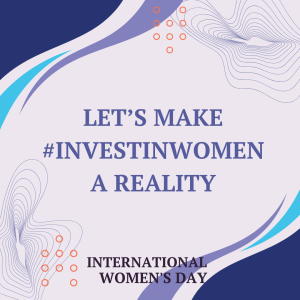This year’s theme for March 8 is #InvestinWomen: Accelerate Progress, which is timely considering divestment in necessary housing and policy solutions has led to today’s crisis
 This International Women’s Day let’s turn a hashtag into a reality for women and gender-diverse people living without a home to call their own or one that meets their needs.
This International Women’s Day let’s turn a hashtag into a reality for women and gender-diverse people living without a home to call their own or one that meets their needs.
The Women’s National Housing & Homelessness Network and it’s sister organization, the National Indigenous Women’s Housing Network fight year round to see investments in funding and policy solutions to address the intersectional housing and homelessness crisis facing women and gender-diverse people.
Women-led households disproportionately live in core housing need, with single-parent, women-led households experiencing the greatest need. There is a severe lack of deeply affordable housing that meets the needs of diverse women and gender-diverse people, many of whom have to choose between paying the rent and feeding their children. With few housing options and overwhelmed emergency shelters, many rely on informal networks or dangerous survival strategies to meet their basic needs, trapping them in situations of hidden homelessness, exploitation, and abuse.
Since investing in women is this year’s theme for International Women’s Day, the need for a transformative departure from the status quo is more urgent than ever.
When denied access to safe and affordable housing, women and gender-diverse people are at high risk of experiencing violence and abuse. The lack of safe and secure housing is often noted as a primary reason women stay in abusive situations, and also why they have to return to violence. Women and gender-diverse people in these circumstances disproportionately face income insecurity and economic stability, making it difficult to compete for housing in overheated rental markets. A lack of appropriate, safe, and secure housing compounds additional issues of discrimination, including those contributing to the disproportionate violence and marginalization facing Indigenous women, girls, and 2SLGBTQQIA people. It is these realities that spurred the Federal Housing Advocate to identify gendered homelessness as one of the most pressing human rights issues in Canada, calling for a human rights inquiry into the Government of Canada’s failure to eliminate homelessness among women and gender-diverse people.
Last month, the WNHHN and NIWHN submitted the Intersectional Feminist Housing Agenda as part of the pre-budget consultation, and now we are pushing it further.
Deputy Prime Minister Chrystia Freeland is presenting the federal budget on April 16, so now is the time to push for women and gender-diverse people’s housing needs to be reflected in it.
Send a letter to Freeland, Prime Minister Justin Trudeau and other federal leaders urging them to support the Feminist Housing Agenda. We’ve already sent 1,500 letters so far, please add your voice so we can keep the momentum going.
We offer these budget recommendations at a moment where we are not seeing our voices reflected in federal housing policy frameworks, nor do we find ourselves at the tables where housing policy is being made. We are particularly concerned with the overemphasis on expanding housing supply through the private market as the answer for our housing challenges. Yet, research and data unequivocally indicate that relying on private market rental development cannot be the sole avenue to rectifying the housing crisis.
Here is what we are asking for to make this budget work for women and gender-diverse people experiencing homelessness or housing instability:
- Invest $4 billion in an Urban, Rural and Northern Indigenous Housing Strategy.
- Raise it to $6.3 billion and ensure an intersectional gendered lens is applied.
- Create 500,000 new rent-geared-to-income social housing units over 10 years (owned by public, non-profit, and co-op housing providers)
- 40% of the units created through this initiative to be allocated to households led by women and gender-diverse people.
- Institute a national Portable Housing Benefit for households who need a top-up on their income to afford market rents.
- Provide supplementary social transfer funds to provinces and territories that agree to raise social assistance rates to match cost of living based on unique jurisdictional realities.
- Ensure that the new Canada Disability Benefit covers the actual cost of housing and necessary supports for persons with disabilities.
- Scale up the Rapid Housing Initiative to meet the level of housing need experienced by women and gender-diverse people with low incomes.
- Incorporate Universal Design Principles into the National Building Code.
- Create minimum national standards for tenant protections, including strong rent and vacancy controls. According to our Pan-Canadian Survey:
- 80% of women and gender-diverse people experiencing homelessness report a history of discrimination from landlords or property managers.
- Almost a third (27.9%) report that prior to becoming homeless, they were unable to access legal support to address their housing situation. This increased to 52.2% for individuals aged 13-24.
- Many women and gender diverse people’s security of tenure is under the control of a romantic or sexual partner (most frequently a man). In order to remain housed, many women and gender-diverse people have to remain in a romantic and/or sexual relationship of some kind, including abusive relationships.
- Adopt and robustly resource a National Encampments Response Plan that is grounded in human rights and a gender-sensitive approach.
- On February 13, the Federal Housing Advocate called on federal government to implement a national encampment response plan by August, echoing our Call to Action in the Agenda.
Let’s make #InvestinWomen a reality and meaningfully end homelessness for women and gender-diverse people, once and for all.

